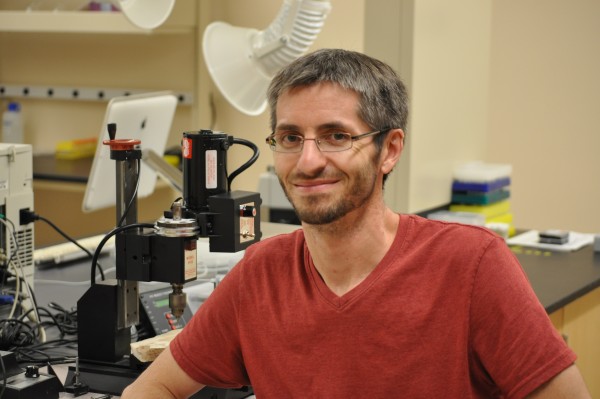Anderson Natural Science Lecture on Nov. 11
Jonathan Baker will give the 2015 Anderson Natural Science Lecture at 7 p.m. on Nov. 11 in Hall-Perrine. His talk is titled “The Tale of 12,000 Russian Winters: A Subterranean Record of Global Climate Change.”
Baker’s talk is based on his research in the southern Ural Mountains. He will talk about his examination of four stalagmites that grew over the past 12,000 years and explain what those figures can tell scientists about both ancient climate and modern climate change.

Baker said that one of the main ways to create a forecast of modern climate is to look at ancient climate data, but that there was little high quality data from Russia, the world’s largest country and a major agricultural producer.
“The results indicate that modern global warming is unprecedented both in rate and magnitude and that continued warming will increase the risk of harsh winters and prolonged drought—two factors detrimental to agriculture—in the southern Volga region,” Baker wrote in his description of the talk. “Additionally, past climate change in Russia was intimately linked to the retreat of continental glaciers in North America, as well as perturbations to the North Atlantic and Arctic oceans. The interconnectivity of the northern hemispheric climate system should thus ring alarm bells for anyone familiar with modern observations of climate change in our northern seas.”
Baker is a Ph.D. candidate in geology, currently visiting from the University of Nevada, Las Vegas. Using cave and lake records, he is studying the climate history of continental western Eurasia to bring perspective to modern global warming. He conducted his doctoral research while living in St. Petersburg, Russia on a Fulbright scholarship, where he has been collaborating with local scientists ever since.
The Anderson Science Lecture was established in 1983 by Richmond K. Anderson ’29 and his wife, Cleo Holland Anderson ’32, in honor of their families. Richmond earned a medical degree at Northwestern University and had a nearly 30-year career in public health. Previous Anderson Lectures have been given by Dudley Herschbach of Harvard, Roald Hoffmann of Cornell University, and William Lipscomb of Harvard, all Nobel laureates in chemistry; Jerald Schnoor of the University of Iowa’s department of civil and environmental engineering; and Victor Weisskopf of the Massachusetts Institute of Technology department of physics.



